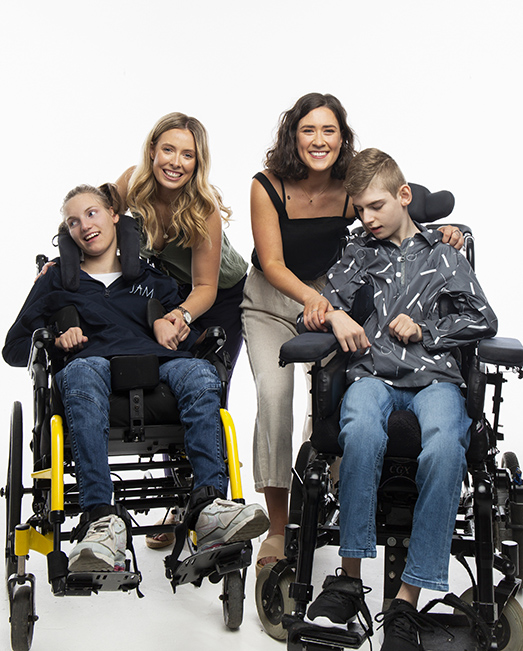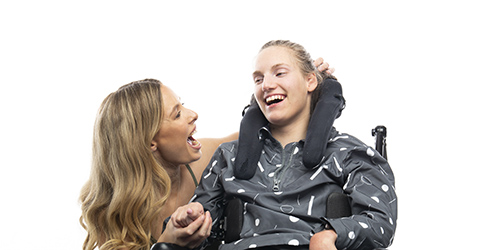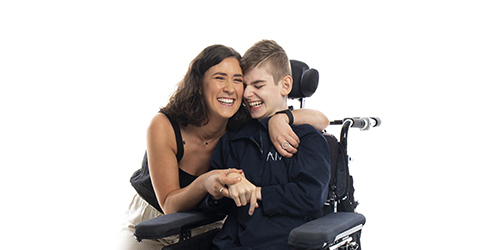Career
Copyright@ Australian Catholic University 1998-2026 | ABN 15 050 192 660 CRICOS registered provider: 00004G | PRV12008
Copyright@ Australian Catholic University 1998-2026 | ABN 15 050 192 660 CRICOS registered provider: 00004G | PRV12008

As two sprightly university students in their early 20s, Emma Clegg and Molly Rogers never really saw themselves as entrepreneurial types.
They shared a common goal of working in occupational therapy to improve the lives of young people with disabilities.
But moving into the start-up space seemed a bit far-fetched.
“I think if someone said to us back then, ‘you're going to start a business’, we would’ve been absolutely shocked,” says Emma, 26. “We are not that way inclined at all.”
“Especially in fashion,” adds Molly, 25. “We definitely wouldn’t have guessed that!”
It was a guest lecture from Jordan O’Reilly, creator of online disability support platform Hireup, that made them realise they had a unique business idea sitting in their pockets.
“Jordan talked about how OTs should adopt an entrepreneurial mindset, because we’re problem-solvers, so we have what it takes to create successful companies that help people,” Molly says.
“That lecture was towards the end of our degrees and it really psyched us up to start JAM the label. It was a game-changer for us.”
JAM is an adaptive clothing company inspired by Jack and Maddie, two teenagers with cerebral palsy.
Molly and Emma cared for the youngsters as disability support workers, while pursuing their Bachelor of Occupational Therapy degrees at ACU’s Melbourne Campus.

Emma and Maddie
They’d often get together after work and talk about the difficulties they had dressing Jack and Maddie.
“We thought it was crazy how hard it was to put a jacket on them in their wheelchair while going for a walk,” says Emma, who now works full-time at a special needs school.
“In places like Melbourne where it goes from warm to cool and back again, you need to put a jacket on and off quite regularly, which is really difficult for people in a wheelchair.
“Often the way you get around that is to put the jacket on backwards, or they have the jacket thrown over them like a blanket, which is just so degrading and it doesn’t keep them warm, so it’s not serving its purpose.”
They searched for local fashion labels aimed at young people with disabilities, but found most adaptive clothing was, frankly, a bit daggy.
Molly and Emma decided to fill the fashion void, by designing clothing that was functional, but funky.
“Rather than focusing on the disability aspect, we wanted to make it like any other fashion label,” says Molly, who now works full-time with adults who have intellectual disabilities.
“We wanted to make clothes that are adaptive but on-trend, that any teenager or young adult would be proud to wear.”
That also meant choosing a name that would appeal to young people.
“It always came back to the fact that Jack and Maddie inspired it, so we thought JAM was a cool way of involving them,” Molly adds, “but it's also a catchy name — it’s memorable and a bit of a conversation-starter.”
Molly and Emma’s business venture was born of the realisation that people with disabilities want to wear fashionable clothes that work for them.
Their first product to hit the market was the confetti jacket: a gender-neutral piece of clothing that’s been adapted for ease of use while sitting in a wheelchair.
“From the front, the jacket looks like a windbreaker — you can’t tell it’s been adapted, but it’s actually designed so it can be put on like a poncho,” Emma says.
“It has hidden zips on either side that start from the wrist, and it also has a shorter back, which means you don’t have to worry about fabric bunching up — a big issue if you’re in a wheelchair.”

Molly and Jack
Although each adaptation was designed with people like Jack and Maddie in mind, the garments can be worn by anyone.
“People with disabilities deserve the chance to wake up in the morning and choose clothing that reflects their style, just like everyone else does,” Molly says.
“It’s about designing clothes in a way that’s inclusive, that embraces universal design, because these are things that can really improve people’s lives.”
This is where Emma and Molly hope to inspire positive change, by influencing mainstream clothing labels to embrace universal design principles.
They point to fashion models like Angel Dixon and Jason Clymo as leaders in the field.
“They are out there in the fashion industry talking about universal design and inclusion, and giving people with a disability a louder voice,” says Emma, who adds that the adaptive clothing movement is more advanced overseas than in Australia.
“Our fashion industry really needs to do more to include people with a disability. Simple things like using alternatives to stitched-on tags, to cater for those with tactile sensitivity — that’s something every clothing brand can do and it should be a priority.”
The duo also plans to launch an online platform that serves as a hub for adaptive clothing in Australia.
“We know there are a lot of people doing good things in this space, so we want to create a space that makes adaptive clothing more accessible to all Australians,” Molly says.
“We want to focus on changing the mindset of Australians towards disability, making it more visible to the fashion industry and the general population, to make them more aware and more inclusive of young people living with disabilities.”
To learn more about JAM the label or buy their products, visit the website.
Keen to study occupational therapy at ACU? Explore the options.
Copyright@ Australian Catholic University 1998-2026 | ABN 15 050 192 660 CRICOS registered provider: 00004G | PRV12008